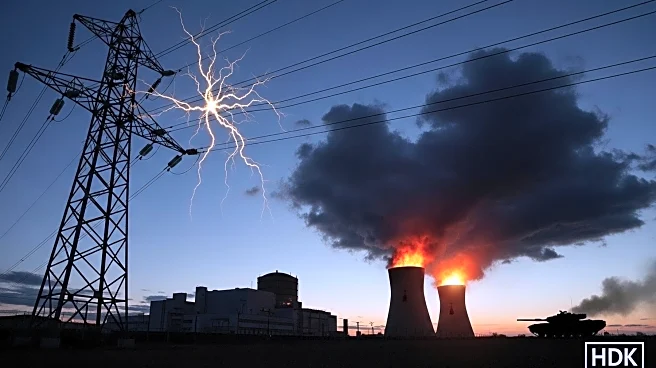What's Happening?
Ukrainian President Volodymyr Zelenskyy has raised alarms over a critical situation at the Zaporizhzhia nuclear power plant, which has been disconnected from the electricity grid for seven consecutive days. This marks the longest outage since the plant was seized by Russian forces during their 2022 invasion of Ukraine. The plant, which is the largest in Europe, is currently relying on diesel generators to maintain essential cooling functions for its reactors. Zelenskyy attributes the outage to Russian shelling, which has hindered efforts to restore the necessary power lines. The International Atomic Energy Agency (IAEA) is actively working with both Ukrainian and Russian sides to reestablish the plant's connection to the grid. IAEA head Rafael Grossi has emphasized the urgency of the situation, noting that while the plant is currently stable, the reliance on diesel generators is not a sustainable solution for nuclear safety.
Why It's Important?
The ongoing power outage at the Zaporizhzhia nuclear plant poses significant risks not only to Ukraine but also to the broader European region. The plant's inability to connect to the grid increases the risk of a nuclear incident, which could have catastrophic consequences. The situation underscores the vulnerabilities of nuclear facilities in conflict zones and highlights the potential for nuclear safety to become a collateral issue in military conflicts. The international community, particularly European nations, has a vested interest in ensuring the plant's safety to prevent a nuclear disaster that could have widespread environmental and health impacts. The incident also reflects the broader geopolitical tensions between Russia and Ukraine, with nuclear safety becoming a point of contention.
What's Next?
Efforts to restore the Zaporizhzhia plant's connection to the electricity grid are ongoing, with the IAEA facilitating discussions between Ukraine and Russia. The situation remains precarious, as continued military activity in the region could further delay repairs. The international community may increase diplomatic pressure on both sides to prioritize nuclear safety and allow for necessary maintenance work. Additionally, there may be calls for enhanced international oversight and support to ensure the plant's stability and prevent future outages.









